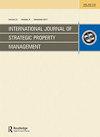Assessing the Impact of Strategic Implementation of Circular Economy on the Competitive Advantage of Canadian Manufacturing Firms
IF 2
4区 管理学
Q3 MANAGEMENT
International Journal of Strategic Property Management
Pub Date : 2023-05-31
DOI:10.53819/81018102t4143
引用次数: 0
Abstract
This literature-based study assessed the influence of strategically implementing circular economy principles on the competitive advantage of manufacturing firms in Canada. Circular economy strategies, which are characterized by reduced resource input, waste, emission, and energy leakage, have risen in importance due to growing global sustainability concerns. Despite the known environmental and economic benefits of transitioning to a circular economy, a comprehensive understanding of its specific impact on competitive advantage has remained relatively unexplored, particularly within the context of the Canadian manufacturing sector. Through a systematic review and analysis of existing literature, this study illuminated the methods that firms adopted for this strategic transition. Such methods included the establishment of closed-loop supply chains, the integration of eco-design, and the shift towards product-as-a-service models. The study also identified and analyzed the challenges encountered during this process, including technical, financial, regulatory, and market barriers, and how firms strategically adapted to overcome these obstacles. The study finally examined the competitive outcomes of these circular economy strategies, assessing their impact on operational efficiency, cost savings, brand reputation, customer loyalty, and market differentiation. The research suggested that effectively implemented circular economy strategies could significantly enhance the sustainability and long-term resilience of Canadian manufacturing firms, while also contributing to competitive advantage. . Keywords: Circular Economy, Strategic Implementation, Competitive Advantage, Canadian Manufacturing Firms, Literature-Based Study循环经济战略实施对加拿大制造业竞争优势的影响评估
这一基于文献的研究评估了战略实施循环经济原则对加拿大制造企业竞争优势的影响。循环经济战略的特点是减少资源投入、浪费、排放和能源泄漏,由于全球对可持续性的关注日益增加,循环经济战略的重要性日益上升。尽管向循环经济转型的环境和经济效益是众所周知的,但对其对竞争优势的具体影响的全面理解仍然相对未被探索,特别是在加拿大制造业的背景下。通过对现有文献的系统回顾和分析,本研究阐明了企业为这一战略转型所采取的方法。这些方法包括建立闭环供应链、整合生态设计以及向产品即服务模式转变。该研究还确定并分析了在这一过程中遇到的挑战,包括技术、金融、监管和市场障碍,以及企业如何从战略上适应以克服这些障碍。该研究最后考察了这些循环经济战略的竞争结果,评估了它们对运营效率、成本节约、品牌声誉、客户忠诚度和市场差异化的影响。研究表明,有效实施循环经济战略可以显著提高加拿大制造业企业的可持续性和长期弹性,同时也有助于竞争优势。关键词:循环经济,战略实施,竞争优势,加拿大制造企业,文献研究
本文章由计算机程序翻译,如有差异,请以英文原文为准。
求助全文
约1分钟内获得全文
求助全文
来源期刊
CiteScore
4.00
自引率
18.50%
发文量
23
审稿时长
15 weeks
期刊介绍:
International Journal of Strategic Property Management is a peer-reviewed, interdisciplinary journal which publishes original research papers. The journal provides a forum for discussion and debate relating to all areas of strategic property management. Topics include, but are not limited to, the following: asset management, facilities management, property policy, budgeting and financial controls, enhancing residential property value, marketing and leasing, risk management, real estate valuation and investment, innovations in residential management, housing finance, sustainability and housing development, applications, etc.

 求助内容:
求助内容: 应助结果提醒方式:
应助结果提醒方式:


